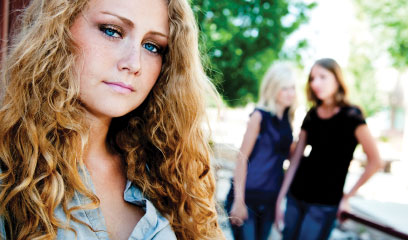 Think back to those girls in seventh grade. You remember them: the ones who cried that a place was "saved" every time you tried to sit down with them at lunch; the ones who bunched together in the school hallways, forming a tight, select circle.
Think back to those girls in seventh grade. You remember them: the ones who cried that a place was "saved" every time you tried to sit down with them at lunch; the ones who bunched together in the school hallways, forming a tight, select circle.
They were -- let's face it -- the group that shaped your middle school experience and kept your emotions vacillating and spinning from the highest highs to the lowest lows.
Coping with teen mean girls
Call them Mean Girls. That's what Hollywood called them in Paramount Pictures' recent satire about the way a new student navigates her harrowing school social ladder. The movie is based on the non-fiction book, Queen Bees & Wannabes, by Rosalind Wiseman.
Few girls survive their tween and teen years unscathed by their peers and mean girls, Wiseman contends. "Every girl I know has been hurt by her girlfriends," she writes. Once upon a time, encountering cliques, "Queen Bees" and manipulative or cruel girls was viewed as a rite of passage. Perhaps, some parents reasoned, mean girls provided a way that their teen daughters could learn coping skills.
These days, the tolerance level for teasing, gossip and power plays has declined, while intervention by schools has risen. What was once viewed as girls-will-be-girls behavior is now labeled "bullying."
"We consider bullying -- including the mean girl syndrome -- peer abuse," says Lisa Reynolds, intervention and prevention specialist for Seattle Public Schools. "When it's repeated, it contributes to lower attendance, lower achievement and depression. It can have devastating effects -- and it's a barrier to learning."
Teen bullying
Dealing with bullying and bullies has become a top priority for the Seattle School District, Reynolds says. "The problem is pervasive in the middle school age group. Teens allow their friends to treat them in ways they don't deserve, and we're not really sure why."
One reason why is puberty, says Dr. Laura Kastner, clinical associate professor of psychiatry and behavior sciences at the University of Washington. At ages 10 and 11, tweens go through changes that are both physical and cognitive, she notes. At the same time, they are developing socially. "They join the new tribe," she says. "Every kid starts to want to hang out with other kids their age, take on their customs and dance, dress like and be like them. It's hard-wired -- like a bird leaving the nest." The peer group becomes all-important and teen girls constantly scrutinize their status in it, Kastner says. "Relationships matter more to girls. Their conversations focus on physical attributes and on being popular."
How can parents help their teen daughters maneuver through these socially challenging years?
 If your daughter is being victimized by mean girls, help her come up with a strategy that empowers her, Kastner advises. "It can be anything that gives her a sense of control over that victimization," she says.
If your daughter is being victimized by mean girls, help her come up with a strategy that empowers her, Kastner advises. "It can be anything that gives her a sense of control over that victimization," she says.
Making friends in different groups
It helps when kids are part of several social groups. "When they have friends in different pockets of their lives -- in soccer, school and synagogue, for example -- they have a backup," she says. In addition, don't intervene too soon. "This is the biggest thing parents blow," Kastner says. "We have the 'mamma bear' reflex. We immediately want to get on the phone. But it's better to bide your time unless there's something really egregious going on."
In the Seattle School District, teachers are working with young students to try to preempt teasing, cruel behavior and online peer abuse. "We start in pre-kindergarten to work on empathy training," Reynolds says. "Later, we talk about power and how it can radiate or destroy. We discuss ways for kids to use their own power in socially acceptable ways."
Seattle educators hope teens will recognize -- and report -- bullying when they see it, she says. "We'd like the kids to go to the school before the parents do." But when repeated bullying is going on, parents should contact the school, says Reynolds. "This is harassment and it requires intervention. The parents are notified and a behavior plan goes into effect."
Typically, the girl who becomes her mean girls' target finds herself isolated and alone. "We're hoping the person doing the bullying will be the one who's isolated," Reynolds says. "It's a slow shift, but it's happening."
Linda Morgan is ParentMap's associate editor; she is also the author of Beyond Smart: Boosting Your Child's Social, Emotional and Academic Potential.









